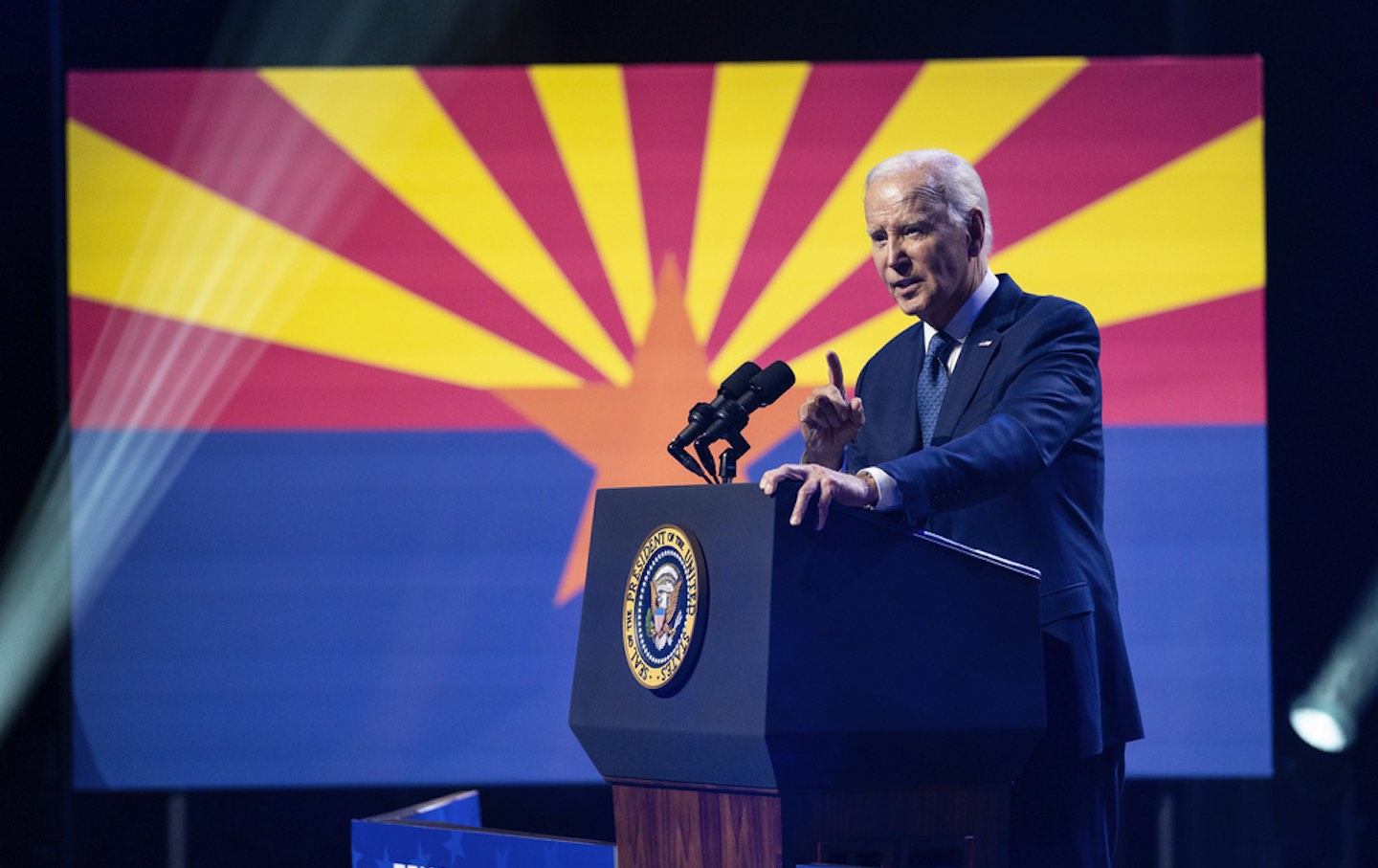Biden Is Struggling to Gain Ground in the West
In key swing states like Arizona, the president’s prospects in 2024 are hardly a sure thing.

President Joe Biden delivers remarks on the late Senator John McCain at the Tempe Center for the Arts, Thursday, September 28, 2023, in Tempe, Ariz.
(Evan Vucci / AP Photo)I had thought, going into this week, that I would write about the stunning budget shortfall that California faces. Because of a huge decline in tax revenues, and ongoing tax-collection delays following last year’s epic winter storms, Governor Newsom and state legislatures will have to somehow plug a gap that the Legislative Analyst’s Office now puts at roughly $68 billion. Over the coming months, as painful cuts are negotiated and cherished social and environmental and healthcare programs come under the microscope, this is a story that, I suspect, I’ll be turning to often.
But so far, the specific nature of those cuts is still up in the air. Other than to mention that a budget deficit of this size is clearly a very, very bad thing, there’s not too much to write just yet. There’s plenty to say, though, about the coming presidential election.
Less than eleven months out from Election Day, Donald Trump is leading President Joe Biden in a slew of national polls. In the all-important swing states—including, out West, Nevada and Arizona—many recent surveys have also found Trump ahead by significant margins, though a recent Reuters/Ipsos poll showed the president clinging to a narrow lead in those states, offering a glimmer of light in an otherwise dark polling landscape.
Parsing these varied polls, the best one can say for Biden is that a president who has presided over a booming economy, navigated the tail end of the pandemic, managed to steer the country through two years of pandemic-induced high inflation and out the other side, and is seeing near-record low unemployment numbers posted month after month—not to mention, succeeding in getting a number of signature legislative reforms through a largely dysfunctional and stalemated Congress—is just about hanging in there against his insurrectionist rival. By the skin of his teeth, Biden is remaining competitive against an opponent who has been indicted on 91 felony charges and is using a fascist language on the stump that is redolent of Hitler and Mussolini’s speeches. That’s hardly a ringing endorsement of the president’s on-the-stump campaign skills.
When I speak to my contacts in Nevada, they tell me the Biden team has yet to get an active ground campaign going in the state. That’s extraordinary, given how vital the state’s six Electoral College votes could end up being. Meanwhile, in Arizona, which Democrats worked so hard to wrest from the GOP over the last decade, Republicans are once again expanding their voter registration edge over Democrats. That edge is now wider than at any point since 2018.
Earlier this week, I had a discussion about this with Mike Noble, whose firm, Noble Predictive Insights, is one of the leading polling outfits in Arizona, and who also does national polls on the country’s mood. Noble’s latest data on Arizona found that the countdown to the 2024 election is taking place against a background in which 28 percent of Arizonans view immigration as the single most concerning issue facing the country, and 24 percent view jobs and the economy as the most concerning issue.
Both of those are areas in which Biden has struggled to connect with voters, and both are fodder for Trump’s demagogic politics.
Even though the economy is, by objective measures, doing surprisingly well, despite the Fed’s regime of high interest rates, the public’s concern is based more on gut checks. Going to the supermarket, one notices higher food prices; filling up the car with gas, one feels the wallet drain. Try to rent or buy a house, and, it goes without saying, one will pay vastly more in monthly payments than was the case even just a few years ago. True, that might be more the fault of the independent Federal Reserve and its determination to raise interest rates no matter the collateral cost, especially vis-à-vis the affordability of housing. But Biden’s getting the blame.
Go on social media, and there’s an endless doom-loop telling you how awful the economy is these days. (Which is probably why, when I talk to many of my students about their impressions of the economy, they tell me that both unemployment and inflation are in double digits, that it’s never been harder for a young person to get a job, and that decent housing is entirely beyond the realm of the possible for them.) People don’t crunch the macro-data, Noble explains, they just go with a hunch: “Do I have more money in my pocket or less?”
On immigration, there’s a perception that Biden’s administration has lost control of the border, and that there is no strategic vision to tamp down the huge number of crossings, daily, by desperate economic migrants. That’s a perception fueled by conservative media outlets, but it’s also one that an increasing number of Democratic big-city mayors, including New York’s Eric Adams, have recently furthered as they have seen their resources stretched by large influxes of new immigrants and have launched increasingly angry critiques of the administration’s border policies.
Put the two issues together, and Biden’s abysmal poll numbers start to make sense. Noble’s team had the president up one point in Arizona during the summer; by late October, they had Trump up 8 percent. Add third-party candidates into the mix, and Noble believes Trump is probably still ahead by about five points. Independent voters in the state are currently breaking by 37 percent for Trump to Biden’s 34 percent, with nearly three in 10 looking for other options.
In other words, it’s not that the disgraced ex-president has suddenly become super-popular; rather it’s that the current president has, over the past year, become increasingly toxic to key voting blocs. Noble’s data shows that 60 percent of Arizonans disapprove of the president’s job performance, and only 37 percent approve. More than six in 10 Arizonan voters want their political candidates to be younger than 60—Biden, of course, is not even close to that. As has been all-too-well documented, he is an octogenarian who is a step or two slower than he used to be and who is prone to verbal gaffes. And while Trump, too, is hardly a spring chicken, polls show that he is seen as being stronger and more assertive than the soft-spoken, slow-moving president.
Popular
“swipe left below to view more authors”Swipe →Over much of the year following the midterms, Biden has failed to enthuse his own grass roots, with large parts of his 2020 coalition, in particular younger voters, no longer trusting his leadership and his policy choices. His messaging isn’t resonating with nearly enough independent, middle-of-the-road voters.
“Trump’s base is stronger and more united than Biden’s is,” Noble said. “The group that’s less consolidated is the younger wing of [Biden’s] party.” Biden, Noble continued, has always had an issue with the youth vote. When he got student loan forgiveness, he got a temporary bump. But then that was rolled back, and then the Middle East exploded, and then Biden’s youth vote crumbled. In Arizona, 86 percent of Republicans say they will vote for Trump; by contrast, at the moment, only 78 percent of Democrats say they will cast ballots for Biden.
There’s still time, of course, for those disaffected Democrats to come home, and for issues such as abortion, which work to drive Democratic turnout, to once again rise up the list of state voters’ concerns. But the party and its candidates have to do a far better job in messaging to these voters.
At the moment, all of the warning signs are flashing red for Biden in key Western battleground states. There’s certainly time for the president—or even some other, younger, more dynamic Democratic candidate—to right the ship, Noble argued, but it has to be done soon. “He can absolutely make up ground, but right now Biden’s looking a little shaky,” he concluded.
Given the stakes in the 2024 election, that’s hardly the news that Democrats—or, more generally, democrats—want to hear.
More from The Nation

What Comes After the Apocalypse? A Q&A With Joshua Oppenheimer What Comes After the Apocalypse? A Q&A With Joshua Oppenheimer
Oppenheimer’s latest film, The End, is a Golden Age, post-apocalyptic musical crying out from the depths of the earth.

What Luigi Mangione and Daniel Penny Are Telling Us About America What Luigi Mangione and Daniel Penny Are Telling Us About America
When social structures corrode, as they are doing now, they trigger desperate deeds like Mangione’s, and rightist vigilantes like Penny.

Donald Trump Is the Authentic American Berserk Donald Trump Is the Authentic American Berserk
Far from being an alien interloper, the incoming president draws from homegrown authoritarianism.

Banning Trans Health Care Puts Young People at Risk of Harm Banning Trans Health Care Puts Young People at Risk of Harm
Contrary to what conservative lawmakers argue, the Supreme Court will increase risks by upholding state bans on gender-affirming care.




